Film Review: Hellraiser Judgment
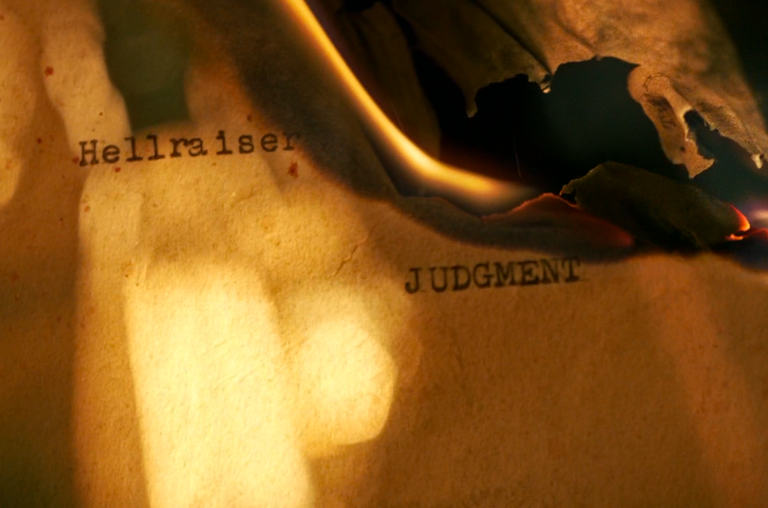 Screenshot
Screenshot
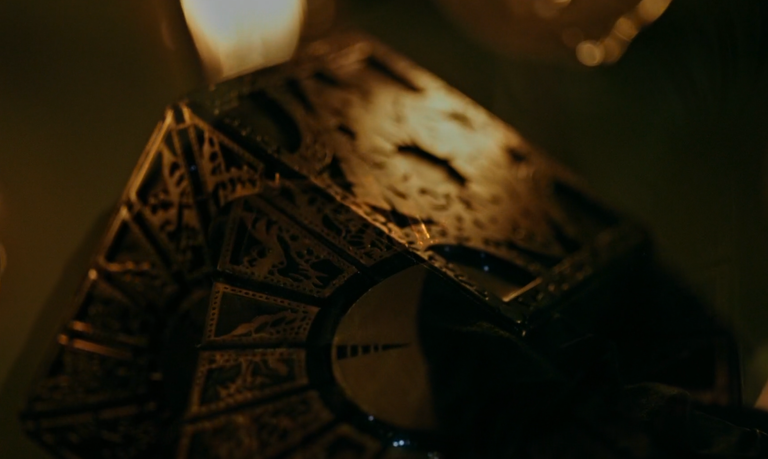 Screenshot
Screenshot
New Age Sin
Hellraiser is to most filmgoers what The Legend of Zelda is to most gamers, a respected title well known even if one has yet to lay eyes on it in the case of the former, or enjoy it in all its majesty on the Nintendo gaming systems in the latter. Indeed, each presents their credentials to understanding head nodding and tips of the cap, traipsing around in the royal regalia befitting of the pioneers of entertainment. Hellraiser, with its dignified patriarch, Pinhead, takes his rightful place in a court amongst the petrifying dealers of death who long haunted the rows of VHS stores in the years gone by.
It was indeed within these hallowed halls that Hellraiser would provoke my young and innocent sensibilities with its terrifying visuals, warning me off towards the more kid-friendly world occupied by the likes of Jim Carey and Robin Williams. However, with the years gone by I would return to this title with a reinvigorated sense of courage whilst nonetheless retaining the curiosity that still hoped to know and feel fear. My first engagement with Hellraiser thus comes by way of Judgment, a film that, to my surprise, positions itself as the 10th of 11 titles bearing the Hellraiser name.
It's a film that wastes no time in introducing (or reintroducing) Pinhead in conversation with what we can only assume is one of his higher-ranking minions. The two realize that in a world of instant gratification, the allure of the fiendish puzzle box which was once a reliable means of insnaring their victims has all but gone the way of Toys' R Us and, quite appropriately, Blockbuster. As such, this hellish faction sets up its operation in a building and lures the most depraved of society with good ol' fashioned hand-typed letters. With the promise of understanding, assistance, and even reward, victims are lured to the house and bound to chairs in which a rather sadistic process is to be meted out.
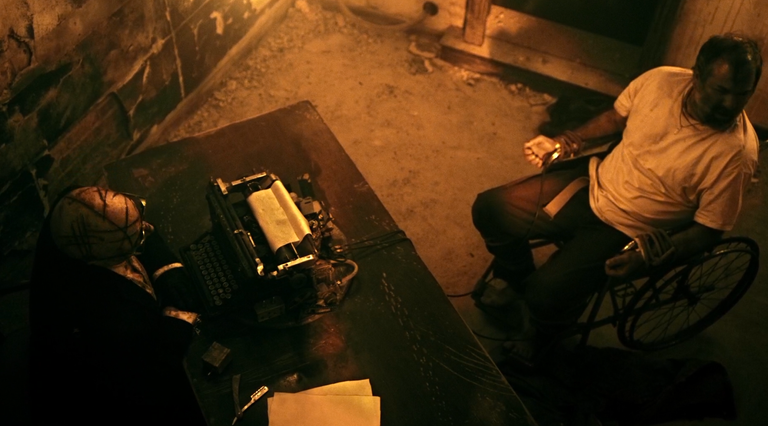 Screenshot
Screenshot
The Audit
The sins of the victims are typed up by The Auditor on paper that has a disturbingly animated look and feel to it, the very mechanisms of the typewriter seeming to feed off of the fettered blood of the predators now reduced to prey. The paper is taken by the assessor who feasts on it like a gluttonous pig, only for his ravenous joy to be momentarily interrupted by the purging of the content of his bowls into a funnel which provides the putrid means in which a jury of butchered women render a verdict, leading to a hard to watch cleansing process at the hands of insatiable maidens, and a menacing pair of butchers.
If I've intrigued you with this disturbingly painted picture, then I'm afraid to say that this is as good as it gets as far as Hellraiser Judgment is concerned, it's indeed a film that writes a cheque that it simply cannot cash, and from the brutality of the first few scenes, the film breaks from its potential by then shifting its focus to an otherwise uninteresting story of two detectives that have "cliche cop" written all over them. At the steering wheel, the grizzled older detective wearing the trusty leather jacket accompanied by boots and jeans rides in his cop car with the good-looking younger partner wearing a suit more appropriate for a yacht party than a crime scene. However, it is a series of crime scenes that the brothers investigate, primarily in the form of gruesome murders at the hands of a serial killer known as The Preceptor.
A good number of sleepless nights, a few glasses of whiskey, and the typical unwanted female presence lead to connections being made between possible suspects and the earlier mentioned torture digs where Pinhead decided to set up shop. Detective Sean Carter, through some very persistent snooping, eventually gets a first-hand introduction to the ongoings of this house of horrors, and it's here where his sins are brought to light, his deep secrets intriguing those above as much as those who dwell below.
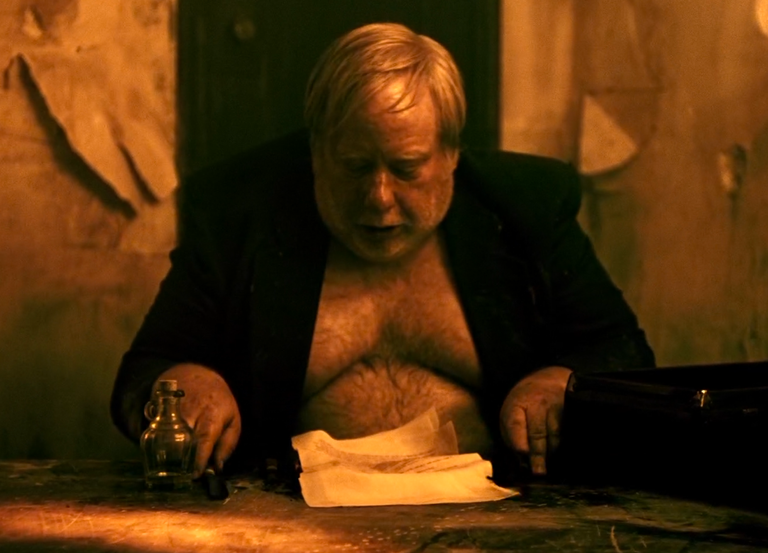 Screenshot
Screenshot
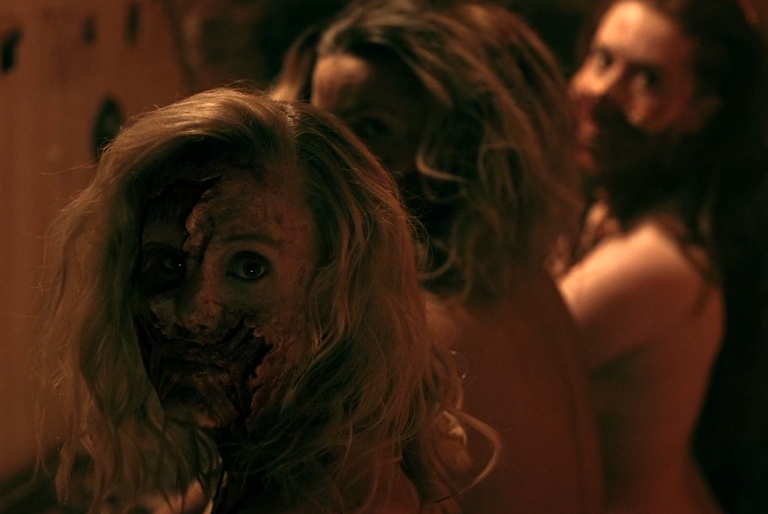 Screenshot
Screenshot
Verdict
I don't much care to go into further detail with this film's storyline and general progression lest I fall asleep at the keyboard. It must at this time, dear reader, be more than obvious that I was slightly disappointed at my first experience with this Hellraiser film. It feels almost comically appropriate there is a focus on the Dickens classic, A Tale of Two Cities, for this film can be best described as a Tale of Two Films, or better still, a Tale of Two Tales. On the one hand, it felt like we had an attempt at an otherworldly enterprise in which Hell's best and brightest were sadistically filling their soul quota. In the next instant, we got a detective film that felt like something out of Dexter or that other series with a psychic hunting a serial killer.
It felt similar to two compound sentences, the independent clauses screaming out for a connection, but the connection between these two strands required fancier footwork than this filmmaker seemed capable of providing. I thought that this film had struck gold with its opening stanza, yet I feel like this could have been unpacked a little more regarding the nature of the individual cogs of the judgment machine, but alas, it was not to be and we were instead forced to settle on forgettable acting, stock audio, and scenes that tried hard to be menacing while altogether failing to find the delicate sort of tuning to strike the fine balance between nauseating revolt on the one hand, with exciting intrigue on the other.
Still, I would give credit to some individual performances, particularly those of the actors entrusted with the roles of Pinhead and The Auditor. Pin Head impressed with a regal and dignified presence in conjunction with a deep voice that made my bones creak, while the Auditor had a sophistication that amplified his terrifying visage. That being said, I would conclude by suggesting that one can save a lot of time and energy by watching the first scenes online and sparing yourself what was otherwise a mediocre attempt at a classic. As always my good readers, I wish you all happy viewing.